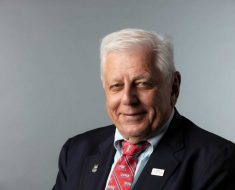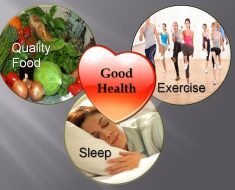DR MICHAEL MOSLEY: Why running more WON’T help you to lose weight… and nor will it make you live longer – that’s just one of the many common myths about exercise
- A recent trial concluded that the benefits of exercise appear to be overstated
Truth be told, I’ve never been that keen on exercise. Yes, I do resistance training at home most mornings and enjoy more unstructured activities such as swimming in the sea and walking in the woods, but I don’t think it’s necessary — or appealing — to go running or sign up for the gym.
So I was delighted to read the results of a recent trial in Finland which concluded that the benefits of exercise, at least as far as longevity is concerned, appear to be overstated, and doing lots of exercise might even be counterproductive.
Yes, exercise will help in other ways, but it won’t help you live longer. This is the latest addition to a list I’ve compiled down the years of the common myths about exercise . . .
MYTH 1: IT WILL MAKE YOU LIVE LONGER
Let’s start with the new research. I’ve no doubt that if you go from being a couch potato to being more active, this will be good for your heart and life expectancy.
But the claims that it will add many years are mainly based on studies where you ask people to fill in questionnaires, then track them to see how long they live. The problem with this approach is there could be genetic factors which extend life, and make you more willing to exercise.

I was delighted to read the results of a recent trial in Finland which concluded that the benefits of exercise, at least as far as longevity is concerned, appear to be overstated, and doing lots of exercise might even be counterproductive

Why would lots of strenuous exercise be bad? Well, it can lead to more injuries, and seems to have a negative impact on the heart (Stock Image)
To get round this, in the latest study, researchers at the University of Jyvaskyla, in Finland, decided to look at the long-term impact of exercise in twins (because twins share many of the same genes).
Their results showed that being active led, at best, to a 7 per cent lower chance of dying than being sedentary.
They also tested biological age using DNA methylation, which measures changes to your DNA and is more accurate at assessing how old you are than what it says in your passport. This showed that the twins who were either very active, or very inactive, were biologically older than those who were modestly active. So doing too much — or too little — exercise is likely to age you.
Why would lots of strenuous exercise be bad? Well, it can lead to more injuries, and seems to have a negative impact on the heart.
A study of American footballers found they are 5.5 times more likely than others their age to have atrial fibrillation, which causes an irregular heartbeat and raises the risk of having a heart attack or stroke.
MYTH 2: IT LEADS TO WEIGHT LOSS
This claim is based on the idea that if you burn more calories through exercise, then you will lose weight. Unfortunately, what study after study has found is that exercise alone is unlikely to lead to long-term weight loss.
Most of the heavy lifting, when it comes to shedding pounds, is done by consuming fewer calories.
A 2014 review in the Journal of the Academy of Nutrition and Dietetics, which looked at the results of six big trials, found there was no real difference between people who lost weight by dieting, or by dieting plus exercise.
Part of the problem is that people often get hungry after exercising and eat more.

This claim is based on the idea that if you burn more calories through exercise, then you will lose weight. Unfortunately, what study after study has found is that exercise alone is unlikely to lead to long-term weight loss (Stock Image)
MYTH 3: IT INCREASES YOUR METABOLIC RATE
When you exercise, your heart rate goes up, which in turn raises your metabolic rate and the number of calories you burn.
The trouble is that your body doesn’t like losing calories, so it sneakily responds in the hours after exercising by slowing your overall metabolic rate down.
This was shown in a 2021 study, where researchers at the University of Roehampton carefully tracked the calories that more than 1,750 volunteers burned while going about their normal lives.
They discovered that although you do burn extra calories when exercising, your body compensates, over the next 24 hours, by burning 28 per cent fewer calories than normal when doing day-to-day things such as sleeping.
And this effect seems to be greatest in people who are overweight or obese — precisely those who may be trying to lose weight.
MYTH 4: IT GIVES AN ENDORPHIN HIGH
It’s often claimed that exercise boosts levels of endorphins, opioid-like substances that your body naturally produces.
But when researchers at the University Medical Center Hamburg-Eppendorf in Germany gave volunteers, who all said they get a ‘runner’s high’, a drug called naloxone, which blocks the impact of endorphins on the brain, it had no effect on the pleasure they got from running.
Most researchers now think that the ‘high’ comes from the release of endocannabinoids, cannabis-like substances that the body naturally produces. But only some people experience this — and sadly, I’m not one of them. A few years ago, I took part in a study at the University of Nottingham where I joined a group of enthusiastic runners for a reasonably long run. By the end, their endocannabinoid levels had soared but mine had flat-lined.

Most researchers now think that the ‘high’ comes from the release of endocannabinoids, cannabis-like substances that the body naturally produces. But only some people experience this — and sadly, I’m not one of them (Stock Image)
Having said all this, I’m all in favour of being active and looking after your muscles.
There is lots of evidence that being active — whether it is walking, taking the stairs or even vacuuming — is good for your brain and can reduce your risk of problems such as depression and anxiety.
We also know that unless you do resistance exercises, such as press-ups and squats, then from the age of 30 onwards, you lose up to 10 per cent of your muscle mass every decade, to the point where you can barely get out of a chair.
That’s why I do resistance training every morning — though I can’t say this ever gives me pleasure.
Source: Read Full Article





